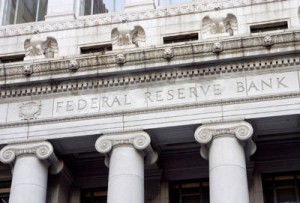Lew Rockwell posted comments from Casey Research partner, David Galland, about major policy shifts at the Federal Reserve.

[Galland]: But there is about to be a fundamental change in this arrangement. It appears that the Fed has decided that it’s time to take a step back from its monetization – or quantitative easing (QE), as they now term it – in the hopes that the market will step in to fill the large gap it will leave.
They can’t know how that’s going to work out, but if they don’t stop pumping money into the economy, they never will know if the quantitative easing has worked.
Based on a lot of statements from a number of the voting members of the Federal Open Market Committee, the change just ahead is that they are serious about stopping QE in June.
[Rockwell]: To be clear, do you mean no QE3, or that they cancel the portion of QE2 they haven’t spent yet?
[Galland]: They may leave themselves a bit of wiggle room by holding back some of the funds slated to be spent as part of QE2, in the hopes of demonstrating a high level of confidence in their decision to stop the monetization.
That would also give them a bit of powder to use should the need suddenly arise, without exceeding the mandate of QE2. The important point is that I am increasingly sure they won’t just roll out QE3, and that will have consequences.
[Rockwell]: Are you saying, no QE3 at all?
[Galland]: No. I think there will be a QE3, but it won’t materialize until after a relatively lengthy period during which the Fed stands aside in order to give the market the opportunity to adapt and adjust to their exit from the Treasury auctions. In other words, once they stop, I wouldn’t anticipate them jumping right back in at the first sign of trouble – say, if the stock market crashes…
For now, however, the Fed will claim victory over the economic crisis and follow suit with many other central banks – switching to a less accommodative monetary policy.
Read it all at Lew Rockwell. There’s much more, and take note that Galland says the Feds realize the problems of 2008 have not solved.
In February, Richard Fisher, the president of the Dallas Fed, said:
But here is the essential fact I want to emphasize and have you think about today: The Fed could not monetize [print dollars] the debt if the debt were not being created by Congress in the first place.The Fed does not create government debt; Congress does. Deficits and the unfunded liabilities of Medicare and Social Security are not created by the Federal Reserve; they are the legacy of Congress. The Fed does not earmark taxpayer money for pet projects in local communities that taxpayers themselves would never countenance; only the Congress does that. The Congress and administration play the dominant role in creating the regulatory environment that incentivizes or discourages job creation.
It seems to me that those lawmakers who advocate “Ending the Fed” might better turn their considerable talents toward ending the fiscal debacle that has for too long run amuck within their own house.







Speak Your Mind
You must be logged in to post a comment.